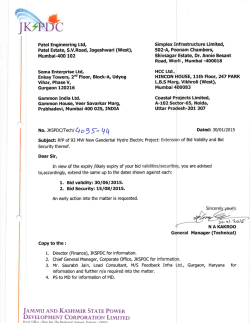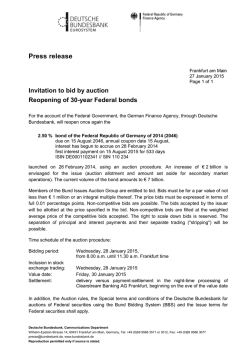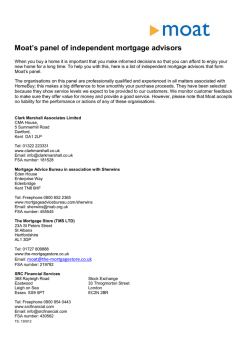
Download (PDF, 1.99MB)
62 Bagger And Counting: An E-commerce Business That Actually Makes MONEY But Almost Didn’t “No man ever steps in the same river twice, for it’s not the same river and he’s not the same man.” — Heraclitus Heraclitus’ words appropriately describe Sunil Agrawal — the man who controls and runs Vaibhav Global Limited (VGL) — one of the world’s most profitable electronic discount jewelry retailers. VGL is also one of India’s handful of e-commerce businesses that actually makes money. The table below shows just how profitable VGL has become over the last 4 years.1 How did this happen? 1 Zigs and Zags VGL’s journey didn’t follow a straight line. There were a lot of zigs and zags, and an experience with near-death too. If you compare the VGL of 2007 with the VGL of 2014, you will find that they are not the same. The contrast is quite stunning and worthy of analysis. In FY06, VGL raised $117 million (Rs 516 cr.) through a GDR issue2 and a preferential allotment to Warburg Pincus — a private equity firm which invested $47 million (Rs 208 cr.) at Rs 277 per share for a 27% stake.3 Using the cash raised, Sunil was building a dream called MISSION B14X: “We aim to be a company with a billion dollar turnover by the year 2014 with 10 per cent profit margin,” claimed the company’s annual report for FY07.4 Well, 2014 came and went, and while Sunil’s margin dream was achieved, the other one — about one billion dollars of revenue — was shattered. That dream which Sunil was building in 2007 involved a business model which looked like this at the time:5 The company was manufacturing and selling fine jewelry through 19 bricks-and-mortar retail stores in Alaska (USA), Mexico, and the Caribbean. Why those places? Because that’s where the cruise ships go and people on cruise ships booze and eat and spend money6 on the sea shore. VGL was also selling fine jewelry to B2B customers like Wal-Mart, JC Penney, Macy’s and to specialty jewellery stores. During FY07, VGL also started 24-hours online jewelry shopping channels in UK and Germany and one in the US in April 2007. There was a plan to gradually shift from a B2B model to a B2C one. The idea was to create an end-to-end value chain from direct procurement of precious stones and diamonds, manufacturing fine jewelry in low-cost places like Thailand and India, to selling fine jewelry through B2B and B2C channels in the western world. 2 It seemed like a good idea at the time.7 But if you think about it now after knowing what happened to the world in 2008 and 2009, you’d very diplomatically say that it wasn’t such a good idea after all. In 2007, among other foolish things, VGL was selling expensive jewelry through bricks-and-mortar stores meant for customers who did impulsive one-time shopping while they are on cruising holidays. Boy, that’s gonna hurt if you knew what was to come. But almost nobody knew. The 2008 economic Tsunami came and destroyed consumer confidence. People didn’t want to go on cruise ships anymore when they had to worry about the sinking market value of their portfolios and their pay cheques. And hundreds of thousands of VGL’s potential customers didn’t even have pay cheques anymore. But all those bricks-and-mortar stores and the airtime on TV channels cost a lot of money. While VGL had raised a good part of that money from equity markets, fulfilling MISSION B14X meant that by the end of FY08, the company had debt of Rs 216 cr. When you have debt, and you are retailer selling discretionary items like fine jewelry, and 2008 is coming, then this is what will happen to your P&L. By the end of March 2009, the stock market was valuing VGL’s equity at just Rs 40 cr., down from Rs 1,200 cr. at the end of March 2006. Recall that Warburg Pincus had bought a 27% stake in the firm in 2006 for Rs 208 cr. which means that Warburg thought it was a worth a lot more than Rs 770 cr. In March 2011, however, Warburg threw in the towel and sold out its 32% stake (including 5% acquired in an open offer) for about Rs 18 cr.8 3 As VGL struggled with collapsing revenues, rising variable costs (gold, silver, platinum, and diamonds) and large fixed costs (airtime on TV and interest on debt), it had little choice but to seek shelter inside Corporate Debt Restructuring (CDR) cell which is where sick corporate patients end up when they are ill. And the table above shows that VGL, by the end of 2008, was very ill indeed. When you’re in a hole, the first thing you must do, advices Warren Buffett, is to stop digging. Sunil was in a hole called deep shit. His MISSION B14X was evaporating in front of his eyes. And he had his own, very ill baby in his arms. You know, as public market investors we guys tend to be rather unemotional about our portfolio holdings. When an investment goes bad, the smart investors amongst us write it off because we have other holdings and other sources of income. Sunk costs are irrelevant, we are told by economists and professors (like me) who never made anything. For people like Sunil, however, sunk costs are anything but irrelevant. For people like Sunil, sunk costs represent blood, tears, toil and sweat. Sunil could not have let VGL die. To be sure, there are some businesses which should be allowed to die, and it’s foolish to throw good money after bad trying to revive a Kodak in a world dominated by iPhones. But, VGL was not Kodak. There are, as you will see, huge advantages of having a vertically integrated, large scale, end-to-end B2C business model in the jewelry business. And people will be buying jewelry several decades from now. It’s not surprising that Warren Buffett’s Berkshire Hathaway owns not one but three jewelry companies. In order to nurse his baby back to health, Sunil took many steps. Some of them have not been adequately highlighted in the financial media, so I am doing it here. First, he did not seek any forgiveness of principal or interest from VGL’s lenders. Instead, he sought, and obtained leniency on time. I have always found this an admirable quality when I evaluate the quality of people running businesses.9 Second, he infused Rs 44 cr. of his own money into VGL by subscribing to the company’s preference shares, which were recently redeemed on a basis that delivered a return of just about 1% a year to him.10 In effect, he gave VGL much needed oxygen, for almost nothing. Third, he became a ruthless surgeon and took upon the task of excising the cancer that made VGL ill in the first place. In his letter to shareholders in the FY09 annual report, he wrote about his role as a surgeon: “We decided to close the businesses that we did not think, would generate cash in coming few quarters. We consolidated various operations to reduce overheads. We renegotiated contracts with various service providers to reduce operational costs. We reduced the workforce at various operating units to match expected demand.” 4 “Above steps resulted in your company to exit German TV retail market and Caribbean and Alaska B&M Retail markets. We exited Japan wholesale market and closed our Thailand manufacturing operations. We consolidated our Gemstone manufacturing operations in Jaipur with our Jewellery manufacturing unit to save on costs and to get better productivity. We recently consolidated our US wholesale operations with our US TV operations in Austin to further save on costs. Renegotiation of various contracts like air-time, rents, shipping costs etc has resulted in substantial savings for coming times.” Fourth, he transformed the business into a discount retailer of fashion (not fine) jewelry with deep focus on B2C segment. How that happened is a story worth telling because it reflects a certain kind of a mindset which is needed to achieve real success in business and as it turns out, in science. It’s a mindset I label as “serendipity” in my list of mental models. The best scientists know about the importance of serendipity, or accidental discovery — a topic beautifully dealt with by Nassim Taleb in his monumental work “The Black Swan.” One of Taleb’s admirers, a blogger called Arlene Goldbard, wrote a review of Taleb’s book which best describes the point. She wrote:11 “I love what Taleb has to say about inventions, how almost all of the discoveries that have had tremendous impact on our culture were accidents in the sense that they were discovered while searching for something else. Because of hindsight bias, he says, histories of economic life and scientific discoveries are written with straightforward story lines: someone set out to do something and succeeded, it’s all about intention and design. But in truth, most of what people were looking for, they did not find. Most of what they found they were not looking for. Penicillin was just some mold inhibiting the growth of another lab culture; lasers at first had no application but were thought to be useful as a form of radar; the Internet was conceived as a military network; and despite massive National Cancer Institute-funded cancer research, the most potent treatment—chemotherapy —was discovered as a side-effect of mustard gas in warfare (people who were exposed to it had very low white blood cell counts). Look at today’s biggest medical moneymakers: Viagra was devised to treat heart disease and high blood pressure.” Most of what people were looking for, they did not find. Most of what they found they were not looking for. Some of the most important discoveries in science follow this pattern. An unexpected finding creates a new insight which eventually results in glory. That eureka moment comes to those who have a curious mindset and are willing to be distracted by an unusual outcome. Such people are called lucky but that’s only part of the explanation. Chance, as Louis Pasteur, used to say, favors the prepared mind. Max Gunther writes:12 “It is a fundamental assumption of the Work Ethic that people ought to have goals and should struggle toward them in a straight line. We are counselled to fix our eyes on our goals, looking neither to the right nor to the left, refusing to be distracted. This is supposed to be the sure route to success. But here is a puzzling fact. It turns out that lucky men and women, on the whole are not straight-line strugglers. They not only permit themselves to be distracted, they invite distraction. Their lives are not straight lines but zigzags.” 5 “The lucky... are aware that life is always going to be a turbulent sea of opportunities drifting randomly past in all directions. If you put blinders on yourself so that you can see only straight ahead, you will miss nearly everything. This is what the unlucky typically do. They stick to preplanned life routes even when they are going nowhere or are actually plodding downhill to disaster.” Going zig and zag, and having the right mindset to spot an opportunity when you see it is crucial. I think something like that happened to Sunil. Sometime during 2008, when he realized that the model of selling fine jewelry to the likes of Wal-Mart or though its own stores to cruise holiday customers is not working out, he decided to liquidate VGL’s inventory and close the US operation. When prices were cut, however, he noticed that the inventory starting flying off the company’s shelves. People were buying deep discounted jewelry in a deep recession. And that created Sunil’s “eureka moment” — an insight, which changed the fortunes of VGL forever. And that insight was this: Why not give up fine jewelry and become a discounted fashion jewelry retailer instead? And so, within the next few quarters, Sunil transformed VGL from a fine jewelry retailer to a fashion jewelry and lifestyle accessories retailer. He priced prices his products so low, that virtually no competitor could afford to match them and still make money. The shift from fine jewelry to deep discount fashion jewelry caused the average selling price per item on the TV platform to drop from $62 in FY10 to $24 in FY14. On the web platform, they dropped from $47 to $13. Building a Low Cost Moat Sunil had accidentally discovered what Sam-Walton of Wal-Mart, Sol Price of Costco, and Rose Blumkin of Nebraska Furniture Mart had figured out long ago. Operate the business so frugally that ensures you have a cost advantage over your competition. (Sunil claims that VGL is so frugal that all senior managers including him travel by economy class even on long-haul international flights.) Keep prices so low that no one in his right mind would enter the market, and those who do would lose their shirts. Warren Buffett absolutely loves the low cost advantage formula and his company owns many businesses which derive their moats from it. One of them is GEICO — the direct seller of automobile insurance to Americans. GECO has the lowest operating costs in its industry primarily because it sells it directly to its customers instead of hiring insurance agents. Buffett calls GEICO’s cost advantage over its competitors as sustainable and writes: “Others may copy our model, but they will be unable to replicate our economics.”13 6 Thanks to the low-cost advantage of VGL, the shift from high-priced fine jewelry to deep discounted fashion jewelry was very hard for any competitor to replicate. Sunil wrote about that in his letter to shareholders in the company’s annual report for FY11: “While there are 8-10 major players in electronic jewelry retail in both US and UK markets, almost none of them addresses the discount market segment. Your company has direct sourcing capabilities, allowing us to competitively price products. This is both congruent to a discount model and is difficult to match by our competitors.” By 2014, the job was largely completed and Sunil wrote in his shareholder letter: “We believe we have hit the sweet spot on product pricing, creating a unique customer proposition that has seen retail sales volumes grow by 35% last year and by more than four times over the last three years. Currently, we ship out over 25,000 unique products every day on an average to our customers who have been constantly increasing their repeat buying on our sales platforms. These gains are based on steady market-share expansion as customers continue to value conscious buying decisions. The deep discount value segment that we address has historically displayed stable growth across every stage of the market cycle. We believe that there is further opportunity to expand the life-time value that we currently derive from our deepening engagement with our customers.” VGL’s moat comes from its low cost advantage which is very hard to replicate. To see how, imagine what you’d have to do to beat Sunil at his game. First, you’d need access to cheap but high-quality raw materials all over Asia in places like Guangzhou, Haifeng, Hauadu Shenzhen, Dongguan, Zhuji, Wenzhou, Wuzhou, Yiwu, Hunan in China, Bangkok, Chang Mai, Mae Sai, Kanchanaburi, Chanthburi in Thailand, and Bali, Yogyakarta, Sumatra, Madura Surabaya in Indonesia. That needs scale, and if you don’t have that, you’ll pay higher prices and you’ll pay the suppliers faster than VGL. Second, you’d need a large scale manufacturing operation in India or some other low-cost destination where you have a skilled workforce. VGL’s manufacturing facility in Jaipur employs more than 2,000 people in India. The company has more than 60,0000 SKU’s and launches more than 100 new designs a day. Finding and training the workforce which can do all of this, and more, at competitive wage rates won’t be easy. Third, you’d need an expert team of people closer to each of your markets to attract customers through TV programming 24 hours a day, 365 days a year, and service them so they have strong incentives to keep coming back for more. You’d need logistical support, IT backbone for inventory management and a call centre capable of dealing with more than 40,000 phone calls a day. Finally, you’d need tens of millions of dollars every year to buy airtime on American, Canadian and British TV networks. Moreover, the terms you’d get from the networks would be inferior to those VGL gets as an existing, large and loyal customer. 7 During FY 11 to FY14 — a period of 4 years — VGL laid out Rs 609 cr.14 in “content and broadcasting” expenses aggregating to a hefty 18% of revenues. A significant proportion of this money spent is a fixed cost which acts as both an entry barrier and a source of operating leverage. As VGL grows, this cost will not go up proportionately and margins will expand unless VGL passes on the entire benefit to its customers. To protect and expand its moat, VGL should pass on at least some of that benefit to its customers in the form of even lower prices. Low prices attract customers but repel competitors. You want both. A huge business volume, moreover, can offset a low margin to deliver an exceptional return on capital, and that is exactly what is happening with VGL as the table in the beginning of this note shows. VGL’s pretax margin on revenues ranged from between 8% and 12% during the years FY11 to FY14 but the pre-tax return on equity averaged about 41%. For a business domiciled in a country where passive rates of return are about 10% a year, that’s a fantastic achievement. A Lesson in Business Economics and Valuation There’s another aspect of the Rs 609 cr. spent by VGL on “content and broadcasting” expenses aggregating from FY11 to FY14 which merits your attention. What’s the nature of this expenditure? To answer that question, think about what it has accomplished for VGL. First, it has helped it gain market share from inefficient players. Second it has delivered huge business volume growth. And third, it acts as an entry barrier. In other words, this money spent has increased the size of the moat around VGL’s economic castle. Any money spent that expands the size of the moat should be treated by business analysts as an expenditure which delivers an enduring advantage — just like capex. However, VGL treats all this money spent as a P&L expense. Therefore, if you want to value VGL appropriately, you should make the necessary adjustment to arrive at “economic earnings” which will exceed reported earnings. That’s the number to discount to value VGL, and not the reported earnings in my view. By the way, exactly the same logic is used by Warren Buffett when he thinks about advertising dollars spent on profitable customer acquisition by GEICO. None of the factors cited above, are, in isolation impossible to accomplish by potential competitors of VGL. Achieving all of them in combination, however, would be very tough. And even someone did, the principle laid down by Buffett would still apply: “Others may copy our model, but they will be unable to replicate our economics.” Illustration of a Buffett Principle To illustrate, let’s compare some key data points on VGL with those of JTV (Jewellery TV) — a direct competitor in the US. As JTV is privately held, there is no financial information on it which is available in the 8 public domain. However, a publicly owned Singapore-based company called Gems TV Holdings owns an indirect stake in JTV. Recently, Gems TV Holdings tried to go private through a tender offer to its minority shareholders. As part of the delisting process, it was required to file a document15 with Singapore Stock Exchange. This document contains crucial information about JTV’s dismal performance over the last few years. I have extracted that information and reproduce it here. This will enable you to see just how strong VGL is when it’s compared with JTV. As the above table demonstrates, one of VGL’s direct competitors is not only in deep financial trouble, it is also losing market share to VGL. How long can JTV last, I do not know. I do know that the above analysis demonstrates the validity of the principle Buffett laid out for low-cost operator businesses: “Others may copy our model, but they will be unable to replicate our economics.” At this time, I would like you to carefully read a VGL presentation16 which lays out quite well, its accomplishments so far, the scalability of its business model, and key performance statistics. -----------The Psychology Lens for Viewing VGL So far, I have described how I see VGL while wearing a “finance lens.” It would be shame however, to not look at the company through a “psychology lens” as well. That’s because VGL’s business model contains beautiful applications of some of the most powerful principles of psychology which I picked up (and now teach) while reading Robert Cialdini and Charlie Munger’s amazing contributions on the subject. 9 It’s the wise application of those principles, that are instrumental in creating the outcome you have seen above. And therefore, no description of VGL will be complete without a discussion of those models. Let’s start by first watching this corporate video. Please spend about 8 minutes of your time and carefully watch the video. In the second part of the video, a hostess displays an item for sale, and talks for several minutes to the viewers while displaying a few other data points on the screen. First, a high initial price for the item is shown. That’s the anchoring effect. The customer will compare the final price with the anchor to determine what an excellent bargain she got. Then, after the display of the initial anchor on the screen, the the price starts falling. This invokes the contrast effect. A drop in price is compared by the initial anchor. The thrill of seeing a drop in price is created. Dopamine (the pleasure chemical) is released in the brains of the viewers. There’s a phone number flashing on the screen. Viewers are encouraged to make a call and bid for the item. The sheer thrill of bidding for something they like seems irresistible. Imagine a viewer talking to her friend on the phone while both of them are viewing the same item which they like. They bid together. It’s fun to bid and see what happens. The inventory of the item keeps dropping implying that the item is being bought by other viewers. That’s called social proof. All species are heavily influenced by the behavior of others. Humans are no different. A drop in the inventory of the item also triggers a “deprival super reaction” response. People respond disproportionately to misses and near misses. For many viewers, the pain of not winning a low priced lovely looking item for just $15 is too much. As the countdown comes to an end, the VGL phones start ringing. When I first saw the video, I immediately wondered what happens to the people who bid higher prices than the final sale price paid by the lowest bidder. Won’t the people who bid higher prices get upset with VGL? Then I found the answer on this page. How does a drop auction work? The initial price is displayed on screen once an item is available for auction. As the auction continues, this amount will drop and each bidder will receive the lowest price indicated for that particular auction. As soon as the items have been purchased the auction will end. Each bid is accepted on a first come first served basis. Aha! So, it’s a game. Everyone is a winner. Even people who bid higher prices for the same item will pay the same low price that everyone will pay. What a fair system. And how seductive! There is no disincentive for early bidding. 10 And then there is the charm of the hostess. See how likeable she is. See how authoritative she is. Isn’t she persuasive? You bet she is. She is an expert. She knows how to pull the right levers. She’s been trained in the art of persuasion. She will charm you into bidding. VGL has 11 hosts and here are their pictures: These people are, in effect, the brand ambassadors for VGL. Except that they don’t cost anything close to what Salman Khan costs for endorsing Relaxo Footwear. And boy, are they likeable. VGL helps you know more about each and every one of them. You can meet them all here. And each one of them are available to you, the customer, to chat with, on Twitter and Facebook, and email. She will talk to you. She will tell you what earnings you should buy that will look awesome with that blue dress that you bought. That’s customer engagement at VGL. Take a look at this video. It introduces Katie Rooke. Watch the video and learn about her childhood, her siblings, her parents, her current family, what she likes wearing and why she loves working for the Liquidation Channel owned by VGL. Now imagine that your mom is watching this. She can probably watch this all day long. You know why? Because Katie makes tomorrow alright. In one of the most memorable movies I have seen — Requiem for a Dream — there’s a scene where a son visits his mom who is old, lonely and bored. She watches TV all day. She has been invited to participate in a competition on TV and in order to look good for the event, she wants to lose weight. She starts taking pills and the son (who is already a drug addict) can see the symptoms on his mom’s body. He confronts her. She claims the pills are harmless. He asks what’s the big deal about you going on TV mom? Then she gives her reply. Watch that reply here. That mom you just saw on that video, is the typical customer who buys from VGL — White, middle aged, female. 11 She says to his son: “It’s not the prizes, Harry. It doesn’t make any difference if I win or lose. It’s like a reason to get up in the morning. It’s a reason to lose weight so I can be healthy. It’s a reason to fit in the red dress. It’s a reason to smile. It makes tomorrow alright.” VGL makes tomorrow alright for millions of moms whose kids have gone away. Is then, VGL really in the fashion jewelry business? Or is VGL a business that provides much-needed entertainment using fashion jewelry as an excuse? Ponder over this question for some time. Now, go to Liquidation Channel where all this drama happens 24 hours a day, 365 days a year. You can watch the shows on TV, or you can watch them on the Liquidation Channel here. Notice, there are no reruns. These are live programs being screened all day. You can watch them on TV, your computer, your iPad or your phone. The programming is device independent. Think about that. When VGL screens the program on TV it has to pay the TV network for the privilege of doing so. But then it screens the same program live on the internet, there is no such fee. And the growth on the web platform is far more than on the TV platform. Now go to the home page of the Liquidation Channel and stay there for a while and observe the same drama I described above play out over and over again. The discounts. The names of the winners on the screen. The thrill of the winning. I now know why moms love TV. It’s their gameboy or playstation. And now, they don’t even have to play on TV. They can play on their iPads. And everyone is a winner. Hooks like these create customer loyalty and repeat purchases. VGL also uses other psychological techniques to gain customer loyalty. For example, it sends out unexpected free gifts to the top 50,000 of its customers. Unexpected good surprises in the form of gifts results in the release of dopamine in the brains of recipients, which creates feelings of immense pleasure. It also generates the feeling of reciprocity. The recipient is more likely to buy again from VGL. On average, every new customer of VGL makes 19 purchases. Isn’t that astonishing? Now, take a look at another innovation — the $1 rising auction page of the Liquidation Channel. What a brilliant idea this is. Why? This is how VGL gets rid of excess inventory which a critical requirement for delivering solid cash flow. How does it work? Every item is starts at $1. Bidders are invited to bid. At such a low starting point, there is an incentive to bid. When the entire inventory is sold, the auction will stop. Or it will stop in the next 10 minutes to 12 hours. You want some thrill? Look at items whose auctions will stop in the next one minute and imagine how much harmless fun it would provide to a lonely, rich, widow watching this on her iPad. 12 Innovations such as the $1 rising auction produce numbers like this — especially when you consider that we are dealing with a B2C retail operation. These models of psychology, properly implemented, not only produce higher sales, they also produce higher asset turns. And when you combine reasonable margins with high asset turns, you get solid returns on capital. -----------Now that you’ve seen VGL from both the financial and the psychological lenses, I think you will understand the “after” story in the chart below which reflects the stock market’s depiction of VGL’s transformation into a highly profitable, cash generating, extremely well financed, and dominant business in its space. As I mentioned earlier, by the end of March 2009, the stock market was valuing VGL’s equity at just Rs 40 cr. As I write this VGL’s equity market cap is Rs 2,460 cr. — making it a 62-bagger from that point. The “before” story of VGL, however — when market cap collapsed from Rs 1,200 cr. in march 2006 to Rs 40 cr. in March 2009 — displayed the exact characteristics, that Buffett once described in his letter to the shareholders of Berkshire Hathaway:17 “Retailing is a tough business. During my investment career, I have watched a large number of retailers enjoy terrific growth and superb returns on equity for a period, and then suddenly nosedive, often all the way into bankruptcy. This shooting-star phenomenon is far more common in retailing than it is in manufacturing or service businesses. In part, this is because a retailer must stay smart, day after day. Your competitor is always copying and then topping whatever you do. Shoppers are meanwhile beckoned in every conceivable way to try a stream of new merchants. In retailing, to coast is to fail.” 13 And elsewhere in the same letter, Buffett wrote: “Buying a retailer without good management is like buying the Eiffel Tower without an elevator.” Those two warnings from Buffett are appropriate because it reflects the averaged-out statistical experience of an industry (baseline information) which is important to keep in mind before contemplating making an investment in it. Despite that handicap, Buffett himself has made investments in a number of retailers. The 2013 annual report of Berkshire Hathaway states: “Our retailing operations consist of four home furnishings businesses (Nebraska Furniture Mart, R.C. Willey, Star Furniture and Jordan’s), three jewelry businesses (Borsheims, Helzberg and Ben Bridge), See’s Candies; Pampered Chef, a direct seller of high quality kitchen tools; and Oriental Trading Company (“OTC”), a direct retailer of party supplies, school supplies and toys and novelties, which we acquired on November 27, 2012.” Buffett’s own averaged-out experience in retail has been terrific despite some bloopers like HH Brown (a shoe manufacturer which got almost killed by low wage completion from overseas) and the very recent Tesco (a public market investment and not a control position) about which I hope he will write about in his forthcoming letter. There will be some lessons there… Anyway, I want you to know that I invested in VGL after spending a lot of time thinking about the business, and the man who is running it. After considering various factors, I figured that based on what Sunil has been able to accomplish so far, VGL’s tomorrow will be alright. Sunil Agrawal will be addressing you tomorrow. He has been working hard for his presentation.18 I am sure you’ll enjoy interacting with him. Disclosure: I own shares in VGL. This note is not a recommendation to buy VGL’s shares. Rather, its a document I have written to help you understand what I liked about VGL. To be sure, there are many things to not like about VGL. There isn’t enough time to list them all. In any case, you should assume that I am biased and I could be wrong. I have been wrong many times in the past. Ends 1 The ROE for FY 14 looks exceptionally high because the Shareholder’s Fund figure for FY13 was suppressed due to an impairment of assets. It’s better to rely on the average figure computed at the end of the table. 2 Promoters bought 66% of the $70 million issue at Rs 323 per share. 3 The purchased triggered an open offer which was made at Rs 279 per share, taking Warburg’s stake to 32.3%. Also, in FY08, VGL raised Rs 95 cr. at Rs 220 per share from Nalanda Capital — another private equity fund, whose fund manager Pulak Prasad also sits on VGL’s board. 14 4 From the Annual Report of VGL for FY07. The last reference to B14X was found in the annual report for FY10. It has not been mentioned since. 5 From the Annual Report of VGL for FY07 6 In 2006, on a Caribbean cruise I bought an Omega watch. It was an impulsive decision. I don’t wear it anymore because I am anxiously waiting for the Apple Watch. 7 Charlie Munger once told a story when he was asked about his badly performing investment in USG: “It reminds me of a story about a man who had a wife and three kids. He conceived an illegitimate child with a woman he'd just met. When asked why he did it, he said, 'It seemed like a good idea at the time.” Source: Notes from the 2002 Wesco annual meeting, May 8, 2002 by Whitney Tilson. 8 See “Warburg Pincus Offloads Vaibhav Gems Stake At Huge Haircut” at http://www.vccircle.com/news/banking/2011/03/01/warburg-pincus-offloadsvaibhav-gems-stake-huge-haircut 9 This stands in stark contrast to many other managers, whom I shall not name here, who have enriched themselves by indulging in zero-sum-gaming behavior with the help of many bank officers with “flexible morals.” 10 If he has issued equity shares to himself instead, the result would have reminded you of Gorden Gekko’s famous quote in the movie Wall Steet: “Dilute the son of a bitch.” Sunil, took the other road instead, and gave VGL, the functional equivalent of an interest-free loan at a time, when VGL needed it the most. 11 See “My New Crush” at http://arlenegoldbard.com/2007/05/09/my-new-crush/ 12 See “How to Get Lucky: 13 techniques for discovering and taking advantage of life's good breaks.” at http://www.amazon.com/How-Get-Lucky-techniques-discoveringebook/dp/B003XRDBYY/ 13 Berkshire Hathaway Annual Report for 1999. 14 From the Annual Reports of VGL from FY11 to FY14. 15 See “EXIT OFFER IN CONNECTION WITH THE DIRECTED DELISTING OF GEMS TV HOLDINGS LIMITED” at http://bit.ly/1EcgoAi. 16 Investor & Analyst meet presentation-June-2014 17 Berkshire Hathaway’s Annual Report for 1995. 18 Many months ago I wrote to Sunil about his coming to my class. In several emails I sent to him, I described how I thought about his business. Here is what he wrote back: “I must confess that most of the behavioral aspects of our business is either learnt from the market place or derived by experiments that we constantly do. I cannot claim that we have thought through the business model from Charlie’s ‘The psychology of human misjudgments’ or Prof Caldini’s ‘Influence’ works or ‘Requiem for a Dream’, or for that matter any of such researched works. I am sure I have much to learn from you on this aspect and many others as I go on this journey of preparing for presentation at MDI.” 15
© Copyright 2026







